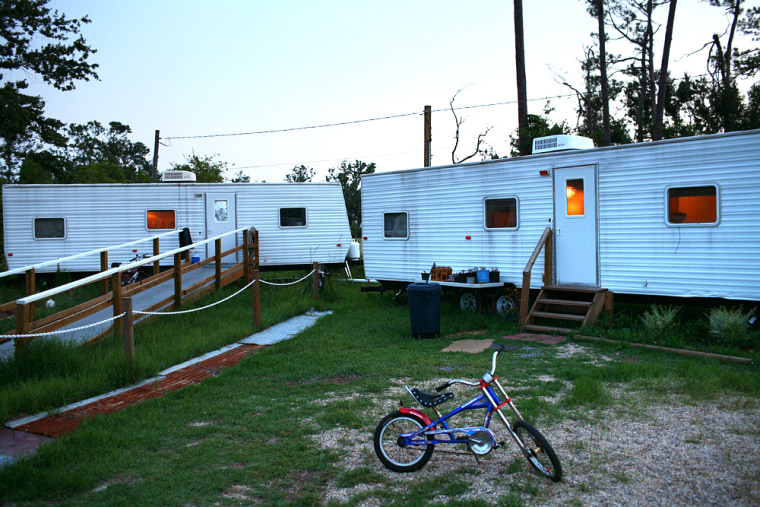Responding to reports that formaldehyde may be sickening hurricane victims living in government-provided travel trailers along the Gulf Coast, the Federal Emergency Management Agency has reversed course and ordered air quality tests to determine if some of the units are emitting unacceptably high levels of the toxic gas.
The tests for formaldehyde –- listed as a human carcinogen, or cancer-causing substance, by the International Agency for Research on Cancer and a suspected human carcinogen by the Environmental Protection Agency -- will be conducted by the EPA, which is currently working with FEMA to finalize a sampling plan, EPA spokeswoman Jennifer Wood said Thursday.
“EPA does not normally test indoor air … but there’s an exception in the Stafford Act that allows for cooperation and testing in a special situation,” she said.
FEMA spokesman Aaron Walker said the agency has requested the tests for formaldehyde “out of an abundance of caution” and added that agency officials remain “highly confident and comfortable in the travel trailer program.”
He said the agency has received only 46 complaints of suspected formaldehyde contamination in the more than 113,000 travel trailers deployed in the Gulf Coast since it began logging calls on a special hot line in March.
But another FEMA official said earlier this week that the agency already has determined that there is a problem with elevated formaldehyde levels in “two or three brands” of the at least 10 brands of travel trailers provided to the government under emergency contracts in the wake of Hurricane Katrina.
Mike Andrews, FEMA’s director of mobile home operations in Mississippi, made the comment Tuesday night at a meeting of the Pascagoula, Miss., City Council, in response to a question from City Councilman Bill Jones.
'He acknowledged ... the problem'
“He acknowledged we’re aware of the problem and we’re trying to do something about it,” Jones said.
Andrews did not identify the models or manufacturers of the trailers and referred calls from MSNBC.com to a FEMA “news desk” in Mississippi, which did not respond to phone calls seeking additional information.
Walker, the FEMA spokesman in Washington, said he was not aware of any testing already conducted in Mississippi.
An official with the Sierra Club, which has spearheaded efforts to get FEMA to test the trailers for formaldehyde, said Andrews’ remarks indicated “that FEMA has now acknowledged there is a problem.”
“But what about the people who don’t know why they have been so sick, why they and their kids get sick again and again?” said Becky Gillette, co-chair of the environmental organization’s Mississippi chapter. “FEMA needs to do far more. It needs to do comprehensive testing and should make sure that people are notified of the problem.”
Many trailer residents have reported experiencing health problems ranging from headaches and runny noses to chronic respiratory problems and nosebleeds shortly after moving into the trailers.
Responding to the anecdotal evidence, the Sierra Club tested 44 FEMA trailers and found formaldehyde concentrations as high as 0.34 parts per million -– a level nearly equal to what a professional embalmer would be exposed to on the job, according to one study of the chemical’s workplace effects.
All but four of the trailers it tested registered higher than the 0.1 parts per million that the EPA considers to be an “elevated level” capable of causing watery eyes, burning in the eyes and throat, nausea, and respiratory distress in some people.
The Department of Housing and Urban Development limits the use of formaldehyde-emitting products in manufactured homes -- setting a standard of 0.2 parts per million for plywood and 0.3 parts per million for particleboard materials. But the agency does not regulate travel trailers or motor homes, probably because it was never anticipated that people would spend long periods of time living in them, said the Sierra Club’s Gillette.
Lawsuit seeks class-action status
he reports of respiratory illnesses among trailer dwellers have led to the filing of at least one lawsuit in Louisiana against the federal government and trailer manufacturers alleging that “the temporary housing is unsafe and presents a clear and present danger to the health and well-being of plaintiffs and their families.” The plaintiffs’ attorneys are asking the U.S. District Court in the Eastern District of Louisiana to grant the case class-action status.
Because of the pending legal action, trailer manufacturers have declined to comment on the situation, but the Recreational Vehicle Industry Association, an industry trade group, says there is no health risk associated with living in a travel trailer.
Interviewed for an earlier MSNBC.com article, RVIA spokesman Kevin Broom said trailer manufacturers use “low-emitting materials” to minimize the “outgassing” of formaldehyde from wood products used in the trailers.
He acknowledged that the high heat and humidity in the Gulf Coast could increase the rate at which the formaldehyde was emitted in the trailers but said that residents could solve the problem by opening doors and windows to improve ventilation.
